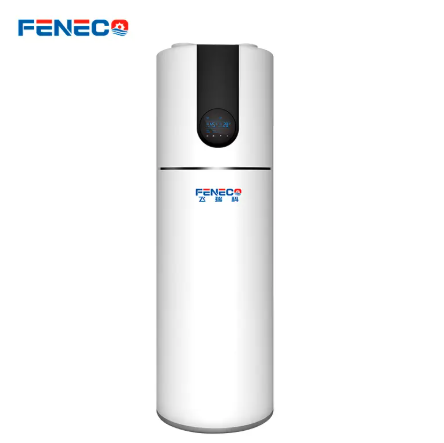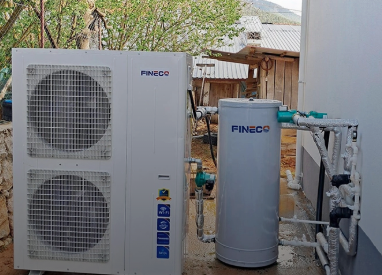Views: 0 Author: Site Editor Publish Time: 2025-09-11 Origin: Site








A heat pump water heater, also known as a hybrid water heater, is one of the most efficient options available today. Instead of creating heat directly like traditional electric tanks, it captures warmth from the air and transfers it to the water. This clever process uses far less energy, helps lower utility bills, and reduces your household’s carbon footprint.
In this guide, we’ll explore everything you need to know—how heat pump water heaters work, their benefits , installation tips, maintenance, and how they compare to other water heating systems. By the end, you’ll know if a hybrid water heater is the right choice for your home.
A heat pump water heater, sometimes called a hybrid water heater, works differently from the standard models many homes use. Instead of making heat directly, it moves heat from the surrounding air into a storage tank. Imagine a refrigerator but in reverse—it pulls warmth from the air and uses it to heat water.
It uses less electricity than old-style electric tanks, and that’s why people switch to it. Families save money and lower their environmental footprint at the same time.
Transfers heat from air, not by burning fuel.
Two to three times more efficient than resistance heaters.
Built-in electric element helps when demand spikes.
Best installed in rooms that stay 40°F–90°F (4–32°C).
| Feature | Heat Pump Water Heater | Electric Water Heater |
|---|---|---|
| How it works | Moves heat from air | Generates heat directly |
| Energy efficiency | 2–3× higher | Lower |
| Environmental impact | Lower emissions | Higher emissions |
| Initial purchase cost | Higher | Lower |

The process is simple but clever. Instead of burning fuel, it relies on heat transfer.
A fan pulls in air from the room.
The air passes over an evaporator coil filled with refrigerant.
The refrigerant absorbs heat, changing into a warm vapor.
A compressor raises the vapor’s pressure and temperature.
This hot vapor flows through a condenser coil wrapped around the water tank.
Heat moves into the water, warming it up.
The refrigerant cools, returns to liquid, and the cycle repeats.
Compressor: Increases refrigerant pressure and heat.
Evaporator: Absorbs heat from air.
Condenser: Transfers heat into the tank water.
Expansion valve: Prepares refrigerant to absorb more heat.
Backup electric element: Ensures reliable hot water supply.
Heat pump water heaters have a positive impact on the environment by emitting fewer greenhouse gases. Since they require less electricity, which is often generated from fossil fuels, they contribute to a smaller carbon footprint. In fact, choosing a heat pump water heater is akin to planting trees in your utility room—it significantly reduces your household’s carbon emissions. This makes heat pump water heaters an excellent choice for environmentally conscious consumers who want to reduce their impact on climate change.
While the upfront cost of a heat pump water heater is higher than that of a traditional electric water heater, the long-term savings are substantial. Most homeowners recover the initial investment through lower utility bills within three to five years. Over a decade, families often save thousands of dollars. After that, the savings continue to accumulate, providing a significant financial benefit. Additionally, many utility companies offer rebates and incentives for installing energy-efficient appliances like heat pump water heaters, which can further reduce the initial cost and shorten the payback period.
Heat pump water heaters are designed to last longer than traditional heaters. With fewer moving parts and advanced technology, they often have a lifespan of 10 to 15 years, compared to the 8 to 12 years of standard electric heaters. This means fewer replacements and repairs over time, adding to the overall savings.
Heat pump water heaters provide a consistent supply of hot water, ensuring that you never run out during peak usage times. They are particularly beneficial for larger households or those with high hot water demands, such as families with teenagers or multiple bathrooms.
When installing a heat pump water heater, it is crucial to choose a location that maintains a temperature range between 40°F–90°F. This ensures optimal performance and efficiency. The space should also have sufficient volume to allow for adequate airflow around the unit. Ideally, there should be at least 1,000 cubic feet of air space to ensure proper operation. Avoid installing the heater in areas with high humidity or where temperatures fluctuate significantly, as this can affect its efficiency and longevity.
Heat pump water heaters extract heat from the surrounding air, which often results in condensation. This means they produce water that needs to be properly drained. A simple drain line connected to a nearby floor drain or a condensate pump can effectively manage this. Proper ventilation is also essential to ensure the unit operates efficiently and safely. Make sure the area around the heater is free from obstructions and has adequate ventilation to prevent moisture buildup and ensure the heat pump can draw in enough air.
Installing a heat pump water heater involves plumbing, electrical work, and often requires permits. Given the complexity and safety considerations, most homeowners opt to hire licensed contractors. Professionals are familiar with local building codes and safety practices, which helps ensure the installation meets all regulatory requirements and is done safely. While DIY installation is possible for those with the right skills and experience, it is generally recommended to leave it to the experts to avoid potential issues and ensure the warranty remains valid.
To maintain the efficiency and longevity of your heat pump water heater, it is important to flush the tank annually. This process helps remove sediment buildup, which can reduce the heater’s efficiency and lead to damage over time. Flushing the tank also helps prevent the accumulation of minerals that can corrode the tank and reduce its lifespan. Regular maintenance in this area ensures that your water heater continues to operate efficiently and provides consistent hot water.
The anode rod plays a critical role in protecting the water heater tank from rust and corrosion. It sacrifices itself to prevent the tank from rusting, so it is important to inspect it annually. When the anode rod shows significant wear or is more than half consumed, it should be replaced. Neglecting this inspection can lead to premature tank failure, which can be costly to repair or replace.
Many heat pump water heaters come equipped with an air filter to ensure the unit operates efficiently. These filters should be cleaned or replaced at least once a year, especially in dusty environments. A clean filter helps maintain proper airflow, which is essential for the heat pump to function effectively. Neglecting filter maintenance can reduce the heater’s efficiency and increase energy consumption.
With proper care and regular maintenance, heat pump water heaters can last between 10 to 15 years, often longer than standard electric heaters. Regular maintenance, such as annual flushing, anode rod inspection, and filter cleaning, can significantly extend the lifespan of the unit. This not only saves money on replacements but also ensures that the heater continues to operate efficiently, providing consistent hot water and energy savings over its lifetime.

Electric tanks are cheaper to buy.
Hybrids cost less to operate long-term.
Gas units heat water quickly but emit carbon monoxide.
Hybrids are safer, greener, and often eligible for rebates.
Tankless provides hot water on demand but struggles under heavy use.
Hybrids handle multiple showers in a row with ease.
Solar is even greener but costly and weather-dependent.
Hybrids work indoors year-round, making them practical for most families.
Most heat pump water heaters last 10–15 years when properly maintained, which is longer than many standard electric units.
Yes, but they run best in areas between 40°F and 90°F. In colder regions, the backup electric element helps maintain hot water supply.
It produces a soft hum, similar to a refrigerator or window AC unit. Placing it in a garage, basement, or utility room minimizes any disturbance.
They need at least 700–1,000 cubic feet of air space for airflow and efficiency. Small closets or tight rooms are not ideal.
At Fineco New Energy Technology Co., Ltd., we specialize in delivering advanced energy-efficient solutions, including high-performance hybrid water heaters designed for modern homes. Our products combine innovative technology with reliable quality, helping families reduce energy bills while supporting a greener future.
If you are considering upgrading your water heating system, Fineco New Energy Technology Co., Ltd. can provide expert guidance, customized solutions, and long-term support to ensure you get the best value from your investment.
